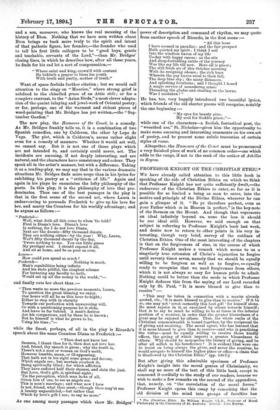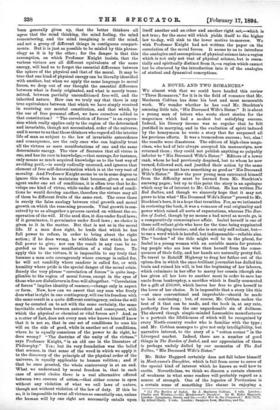PROFESSOR KNIGHT ON THE CHRISTIAN ETHIC.* WE have already called
attention to this little book in
speaking of the side of Christian Ethics on which we think that Professor Knight has not quite sufficiently dwelt,—the endeavour of the Christian Ethics to enter, so far as it is possible for so limited a being as man to enter, into the motive and principle of the Divine Ethics, wherever he can gain a glimpse of it. "Be ye therefore perfect, even as your Father which is in Heaven is perfect," is the key-note of the Sermon on the Mount. And though that represents an ideal infinitely beyond us, none the less it should be our ideal still. However, we said enough on that subject in referring to Professor Knight's book last week, and desire now to return to other points in his very in- teresting, though very brief, survey of the outlines of Christian Ethics. One of the most interesting of the chapters is that on the forgiveness of sins, in the course of which Professor Knight makes a remark which seems to us a singularly true extension of Christ's injunction to forgive until seventy times seven, namely that we should be equally willing to be forgiven as well as to forgive, — equally ready to recognise that we need forgiveness from others, which it is not always so easy for human pride to admit. Nothing could be better than the mode in which Professor Knight deduces this from the saying of our Lord recorded only by St. Paul, "It is more blessed to give than to receive" :—
"This may be taken in connection with a maxim already quoted, viz., it is more blessed to give than to receive.' If it be so, one may not ' covet earnestly this best gift' for himself alone. He must rejoice in it, as exercised by others towards himself ; that is to say he must be willing to be at times in the inferior position of a receiver, in order that the greater blessedness of a giver may be enjoyed by others. Thus, the whole realm of the Christian commonwealth is bound together, by the reciprocal tie of giving and receiving. The moral agent, who has learned that it is more blessed to give than to receive—and who is practising the virtue—must be equally willing to receive those kindly offices, the giving of which imparts a greater blessedness to others. Why should he monopolise the luxury of giving, and be after all selfish in his beneficence ? It is evident that were one to insist on being always the giver, and never the receiver, he would arrogate to himself the higher place or office—a claim that is disallowed by the Christian Ethic." (pp. 106-7.) But after giving this admirable specimen of Professor
Knight's insight into the moral genius of Christianity, we shall say no more of the text of this little book, except to
commend it cordially to the study of our readers, because we wish to make a few remarks on the second of the appendices, that, namely, on "the correlation of the moral forces." Professor Knight opens this essay by remarking that the old division of the mind into groups of faculties has • The Christian Ethic. By William Knight. LL.D., Professor of Mord Philosophy in the University of St. Andrews. London : John Murray.
been generally given up, that the better thinkers all agree that the mind thinking, the mind feeling, the mind remembering, and the mind imagining is still the mind, and not a group of different things in contiguous compart- ments. But it is just as possible to be misled by this phrase- -ology as it is by the other; for the danger is that this assumption, on which Professor Knight insists, that the various virtues are all different equivalents of the same energy, will lead us to forget the essential difference between the sphere of the physical and that of the moral. It may be true that one kind of physical energy can be literally identified with another, but when we apply the same language to moral forces, we drop out of our thought the essential difference between what is freely originated, and what is merely trans- mitted, between partially unconditioned free-will, and the inherited nature. How can we truly say that there is any true equivalence between that which we have simply received in receiving our mental constitution, and that which, by the use of free personal effort, we have ourselves added to that constitution? "The correlation of forces" is an expres- sion which really applies only to the region of the determined and invariable, though not necessitated, order of the universe, and it seems tons that those thinkers who regard all the interior life of man as subject to the law of invariable antecedence and consequence, are the only ones who can logically treat all the virtues as mere manifestations of one and the same -determinate energy. The view of Socrates that all virtue is one, and has its root in knowledge,—that courage, for instance, -only means so much acquired knowledge as to the beat way of avoiding peril,—is surely radically unsound, and ignores that element of free self-determination which is at the very root of morality. And Professor Knight seems to us in some degree to ignore this when he maintains that because, given a moral agent under one set of conditions, it is often true that he de- velops one kind of virtue, while under a different set of condi- tions he would develop another, therefore the virtues may all of them be different fruits of the same root. The error there is surely the false analogy between vital growth and moral growth on which the reasoning proceeds. Vital growth is con- ceived by us as altogether a process carried on without the co- -operation of the will. If the seed dies, it dies under fixed laws; if it germinates, it germinates under fixed laws ; no choice is given to it in the matter. But that is not so in the moral life. If a man does right, he lends that which he has full power to refuse, in order to bring about the right action ; if he does wrong, he withholds that which he has full power to give; nor can the result in any case be re- garded as the mere manifestation of a vital force. To apply this to the virtues, it is impossible to say truly that because a man acts courageously where courage is called for, be will act candidly where candour is called for, or with humility where pride is the special danger of the moral crisis. Surely the very phrase "correlation of forces" is quite inap- plicable to the region of moral forces, except in the eyes of those who are disbelievers in free-will altogether. "Correlation of forces" implies identity of essence,—change only in aspect or form. Now, how can we assert that any man who freely does what is right in one contingency, will use his freedom with the same result in a quite different contingency, unless the will may be counted on to act with the same certainty, the same inevitable relation between antecedent and consequent, with which the physical or chemical or vital forces act? And, as a matter of fact, does not every man who knows himself know that it is not so, that in one set of conditions he uses his will on the side of good, while in another set of conditions, where he is equally conscious of the power to do right, he does wrong? "The doctrine of the unity of the virtues," says Professor Knight, "is an old one in the literature of Philosophy." Yes; but its very foundation was the belief that science, in that sense of the word in which we apply it -to the discovery of the principle of the physical order of the universe, is equally applicable to human volition ; and if that be once granted, the whole controversy is at an end. What we understand by moral freedom is, that in each case of moral choice there is a real alternative offered between two courses of action,—that either course is open without any violation of what we call laws of nature, though not without violation of the law of duty. If this be so, it is impossible to treat all virtues as essentially one, unless the human will by one right act necessarily entails upon itself another and an other and another right act,—which is not true; for the same will which yields itself to the higher law to-day, will sink to the lower motive to-morrow. We wish Professor Knight had not written the paper on the correlation of the moral forces. It seems to us to introduce the analogies and assumptions of physical science into a region which is not only not that of physical science, but is essen- tially and spiritually distinct from it,—a region which cannot but be obscured by the introduction into it of the analogies of statical and dynamical conceptions.







































 Previous page
Previous page